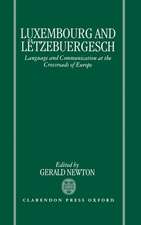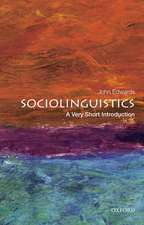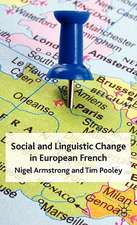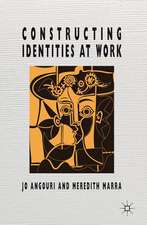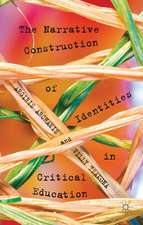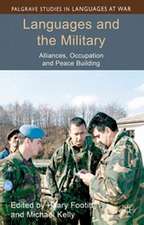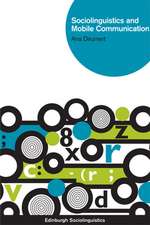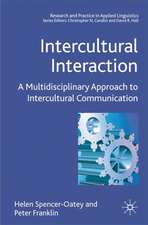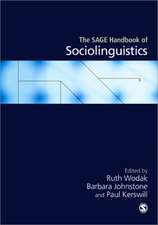Linguistic Perspectives on a Variable English Morpheme: Let's talk about –s
Autor Laura Rupp, David Britainen Limba Engleză Hardback – 24 iun 2019
Preț: 590.81 lei
Preț vechi: 695.08 lei
-15% Nou
Puncte Express: 886
Preț estimativ în valută:
113.05€ • 118.67$ • 93.83£
113.05€ • 118.67$ • 93.83£
Carte tipărită la comandă
Livrare economică 10-24 aprilie
Preluare comenzi: 021 569.72.76
Specificații
ISBN-13: 9781403939685
ISBN-10: 1403939683
Pagini: 256
Ilustrații: XI, 370 p. 28 illus., 1 illus. in color.
Dimensiuni: 148 x 210 x 28 mm
Greutate: 0.61 kg
Ediția:1st ed. 2019
Editura: Palgrave Macmillan UK
Colecția Palgrave Macmillan
Locul publicării:London, United Kingdom
ISBN-10: 1403939683
Pagini: 256
Ilustrații: XI, 370 p. 28 illus., 1 illus. in color.
Dimensiuni: 148 x 210 x 28 mm
Greutate: 0.61 kg
Ediția:1st ed. 2019
Editura: Palgrave Macmillan UK
Colecția Palgrave Macmillan
Locul publicării:London, United Kingdom
Cuprins
Introduction.- Chapter 1: Verbal –s.- Chapter 2: Verbal Zero.- Chapter 3: Past BE.- Chapter 4: Verbal –s in Existential there sentences.- Conclusion.
Recenzii
“Whether diagrammatic iconicity is really the underlying motivation for these phenomena or rather a very general observable outcome is a matter up for further discussion, for which this volume provides considerable incentive. … This volume could serve as a precursor for future fruitful discussions predicated on this proposed integrative approach.” (Nikolaus Wildner, Language in Society, Vol. 51 (5), 2022)
Notă biografică
Laura Rupp is a Universitair Hoofddocent Engelse Taalkunde at Vrije Universiteit Amsterdam, The Netherlands. Her research interest embrace grammatical variation and change, the interface between grammar and discourse-pragmatics, and (diversity in) English pronunciation. Her most recent research projects have been on verbal –s in English and variation in the use of articles.
David Britain is Professor of Modern English Linguistics at the University of Bern, Switzerland. His research interests embrace language variation and change, varieties of English (especially in Southern England, the Southern Hemisphere and the Pacific), dialect contact and attrition, dialect ideologies, and the dialectology-human geography interface, especially with respect to space/place, urban/rural and the role of mobilities.
David Britain is Professor of Modern English Linguistics at the University of Bern, Switzerland. His research interests embrace language variation and change, varieties of English (especially in Southern England, the Southern Hemisphere and the Pacific), dialect contact and attrition, dialect ideologies, and the dialectology-human geography interface, especially with respect to space/place, urban/rural and the role of mobilities.
Textul de pe ultima copertă
This book investigates –s marking in English verbs, specifically its manifestations in main verbs, in the past tense of BE, and in existential constructions. It embraces the many ways in which –s marking varies across the English speaking world, and considers both how it arose in these places historically and the ways in which it has since developed. The authors propose a story which holistically accounts for these different manifestations of –s, drawing upon evidence from a wide range of subdisciplines in linguistics, including sociolinguistics, generative syntax, historical linguistics, dialectology, and discourse-pragmatics. This book will be of particular interest to students and scholars in these and related fields.
Laura Rupp is a Universitair Hoofddocent Engelse Taalkunde at Vrije Universiteit Amsterdam, The Netherlands. Her research interest embrace grammatical variation and change, the interface between grammar and discourse-pragmatics, and (diversity in) English pronunciation. Her most recent research projects have been on verbal –s in English and variation in the use of articles.
David Britain is Professor of Modern English Linguistics at the University of Bern, Switzerland. His research interests embrace language variation and change, varieties of English (especially in Southern England, the Southern Hemisphere and the Pacific), dialect contact and attrition, dialect ideologies, and the dialectology-human geography interface, especially with respect to space/place, urban/rural and the role of mobilities.
Laura Rupp is a Universitair Hoofddocent Engelse Taalkunde at Vrije Universiteit Amsterdam, The Netherlands. Her research interest embrace grammatical variation and change, the interface between grammar and discourse-pragmatics, and (diversity in) English pronunciation. Her most recent research projects have been on verbal –s in English and variation in the use of articles.
David Britain is Professor of Modern English Linguistics at the University of Bern, Switzerland. His research interests embrace language variation and change, varieties of English (especially in Southern England, the Southern Hemisphere and the Pacific), dialect contact and attrition, dialect ideologies, and the dialectology-human geography interface, especially with respect to space/place, urban/rural and the role of mobilities.
Caracteristici
Examines how –s emerged historically, the way it developed, how it has been distributed geographically and socially, and the work it performs in the English language Explores a wide range of alternative linguistic, social and stylistic functions performed by –s in non-standard dialects of English Argues that adequate understanding of –s marking can only be achieved by integrating perspectives from different disciplines

